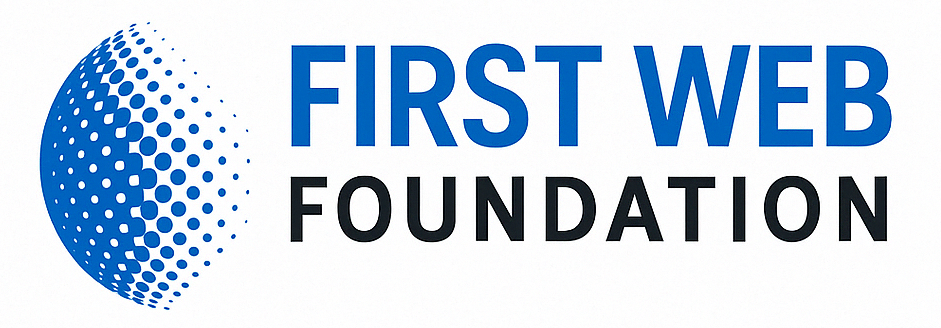FIRST WEB FOUNDATION COMMUNITY ANTI-HARASSMENT POLICY AND TERMS OF PARTICIPATION AND COMPLAINT PROCEDURE
Adopted on 12 April 2023
The First Web Foundation community is comprised of participants from numerous and varied backgrounds, societal values, and cultural norms. A guiding goal of First Web Foundation’s Community Anti-Harassment Policy is to emphasize, encourage, and promote the spirit of mutual respect expected within the First Web Foundation community. Society’s values and norms have and will continue to evolve. However, such respect is timeless and is a guiding foundation of this Policy. This Policy is not intended to impede or inhibit free speech.
As a condition of participation in First Web Foundation’s multi-stakeholder processes, those who take part must:
- Behave in a professional manner, demonstrate appropriate behaviour and treat all members of the First Web Foundation community in a respectful, dignified, decent manner at all times, including in face-to-face and online communications, irrespective of Specified Characteristics so that individuals of all backgrounds and cultures are made to feel welcome. Specified Characteristics means, but are not limited to, the following: age, ancestry, ethnicity, physical or mental disability, genetic information, medical condition, marital status, national origin, race, religion, sex (which includes, among other things, gender, gender identity and gender expression), sexual orientation, citizenship, primary language, immigration status, socioeconomic status, pregnancy, childbirth, or medical conditions related to pregnancy.
- Refrain from harassment of any type. Harassment is unwelcome non-consensual hostile or intimidating behaviour. Harassing conduct or commentary may take many forms, including, but not limited to, verbal acts and name-calling; graphic and written statements, which may include the use of phones or the Internet; or other conduct that may be physically threatening, harmful, or humiliating. Conduct does not have to intend to harm, be directed at a specific target, or involve repeated incidents in order for it to be deemed harassment. Examples of the types of inappropriate conduct that are prohibited by this Policy include, but are not limited to, the following:
- Inappropriate touching, including, but not limited to, sexually suggestive touching such as grabbing, groping, kissing, fondling, hugging, stroking someone’s hair, or brushing against another’s body, or touching that the actor may not have intended to be sexually suggestive, but which constitutes uninvited touching, such as rubbing or massaging someone’s neck or shoulders
- Use of offensive language
- Violating someone’s “personal space” after being told you are doing so
- Leering, stalking, or suggestive whistling
- Gesturing in a sexually suggestive manner
- Circulating or posting written or graphic materials that show hostility or disrespect toward or that demean individual because of Specified Characteristics as set forth above
- Lewd or graphic comments or jokes
- Use or distribution of sexual imagery in public presentations and displays
- Harassing photography or recordings
- Repeated requests for dates, or unwanted communications of a romantic nature, after the individual receiving them indicates that she or he does not wish to receive them.
- Refrain from retaliation against anyone for reporting any conduct or commentary that is inconsistent with the terms set forth above (“inappropriate behaviour”) or for participating in an investigation of any such report or complaint.
Reporting and Complaint Procedure
The following reporting and complaint procedure is available to anyone who identifies inappropriate behaviour.
- The individual who identifies inappropriate behaviour may: (i) communicate with the person(s) responsible and attempt to resolve the issue informally; and/or (ii) promptly report to the IRST WEB FOUNDATION’s Complaints Department the facts giving rise to a belief that inappropriate behaviour has occurred and cooperate fully in the ensuing investigation of the complaint.
- The First Web Foundation Complaints Department will review and evaluate the complaint. The evaluation will include the following, as appropriate in the sole discretion of the Complaints Department, in an effort to obtain an understanding of the facts: (i) communication with the complainant to clarify the facts giving rise to the complaint; (ii) inquiries of the accused to obtain a response to the complaint if, in the Complaints Department’s discretion, the complainant has provided sufficient facts to support the allegation that inappropriate behaviour has occurred; and (iii) communication with other percipient witnesses, and review of documentary evidence, if any, and if appropriate.
- The Complaints Department will determine whether inappropriate behaviour has occurred and will communicate the results to the complainant and the accused. No “corroboration” is required to support a finding; the Complaints Department will consider the credibility of each party in making a determination.
- The Complaints Department will determine what remedial action, if any, is appropriate in light of the findings of the evaluation. If the Complaints Department at its discretion finds that remedial action is appropriate, that remedial action may include, but is not limited to, excusing any individual responsible for inappropriate behaviour from further participation in the First Web Foundation process for a specified period of time, limiting the individual’s participation in some manner, and/or requiring the satisfaction of pre-requisites such as a written apology as a condition of future participation.
- The reporting and complaint procedure will be conducted in a manner to ensure confidentiality to the reporter as well as the person who is the subject of the complaint.
